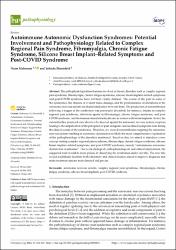Autoimmune autonomic dysfunction syndromes: Potential involvement and pathophysiology related to complex regional pain syndrome, fibromyalgia, chronic fatigue syndrome, silicone breast implant–related symptoms and post-COVID syndrome

Göster/
Erişim
info:eu-repo/semantics/openAccessAttribution 4.0 Internationalhttps://creativecommons.org/licenses/by/4.0/Tarih
2022Üst veri
Tüm öğe kaydını gösterKünye
Mahroum, N. ve Shoenfeld, Y. (2022). Autoimmune autonomic dysfunction syndromes: Potential involvement and pathophysiology related to complex regional pain syndrome, fibromyalgia, chronic fatigue syndrome, silicone breast implant–related symptoms and post-COVID syndrome. Pathophysiology, 29(3), 414-425. https://doi.org/10.3390/pathophysiology29030033Özet
The pathophysiological mechanisms involved in chronic disorders such as complex regional pain syndrome, fibromyalgia, chronic fatigue syndrome, silicone breast implant–related symptoms, and post-COVID syndrome have not been clearly defined. The course of the pain in some of the syndromes, the absence of evident tissue damage, and the predominance of alterations in the autonomic nervous system are shared similarities between them. The production of autoantibodies following a trigger in the syndromes was previously described, for instance, trauma in complex regional pain syndrome, infectious agents in fibromyalgia, chronic fatigue syndrome, and post-COVID syndrome, and the immune stimulation by silicone in women with breast implants. In fact, the autoantibodies produced were shown to be directed against the autonomic nervous system receptors, leading to the amplification of the perception of pain alongside various clinical symptoms seen during the clinical course of the syndromes. Therefore, we viewed autoantibodies targeting the autonomic nervous system resulting in autonomic dysfunction as likely the most comprehensive explanation of the pathophysiology of the disorders mentioned. Based on this, we aimed to introduce a new concept uniting complex regional pain syndrome, fibromyalgia, chronic fatigue syndrome, silicone breast implant–related symptoms, and post-COVID syndrome, namely “autoimmune autonomic dysfunction syndromes”. Due to its etiological, pathophysiological, and clinical implications, the suggested term would be more precise in classifying the syndromes under one title. The new title would doubtlessly facilitate both laboratory and clinical studies aimed to improve diagnosis and make treatment options more directed and precise.
Scopus Q Kategorisi
Q2Kaynak
PathophysiologyCilt
29Sayı
3Koleksiyonlar
İlgili Öğeler
Başlık, yazar, küratör ve konuya göre gösterilen ilgili öğeler.
-
Rituximab treatment for difficult-to-treat nephrotic syndrome in children: A multicenter, retrospective study
Taşdemir, Mehmet; Canpolat, Nur; Yıldız, Nurdan; Özçelik, Gül; Benzer, Meryem; Saygılı, Seha Kamil; Özkayın, Emine Neşe; Türkkan, Özde Nisa; Balat, Ayşe; Candan, Cengiz; Çelakıl, Mehtap; Yavuz, Sevgi; Akıncı, Nurver; Göknar, Nilüfer; Akgün, Cihangir; Tülpar, Sebahat; Alpay, Harika; Sever, Fatma Lale; Bilge, İlmay (TÜBİTAK Scientific and Technological Research Council of Turkey, 2021)Background/aim: This study aimed to evaluate the efficacy of rituximab in children with difficult-to-treat nephrotic syndrome, considering the type of disease (steroid-sensitive or -resistant) and the dosing regimen. Materials ... -
The savant syndrome: a gift or a disability? A deeper look into metabolic correlates of hidden cognitive capacity
Onin, İrem; Hanoğlu, Lütfü; Yuluğ, Burak (Bentham Science Publishers, 2023)Savant syndrome is a rare and unusual condition that occurs in the presence of severe developmental disabilities, disorders, and injuries. The syndrome can be congenital from birth to childhood or acquired as a result of ... -
Neglected lunate dislocation presenting as carpal tunnel syndrome
Cansu, Eren; Heydar, Ahmed Majid; Elekberov, Anar; Ünal, Mehmet Bekir (Taylor & Francis, 2015)Most of carpal tunnel syndrome cases are idiopathic, and secondary causes are so rare that can be easily missed. We present a patient with neglected undiagnosed lunate dislocation compressing on median nerve causing its ...


















